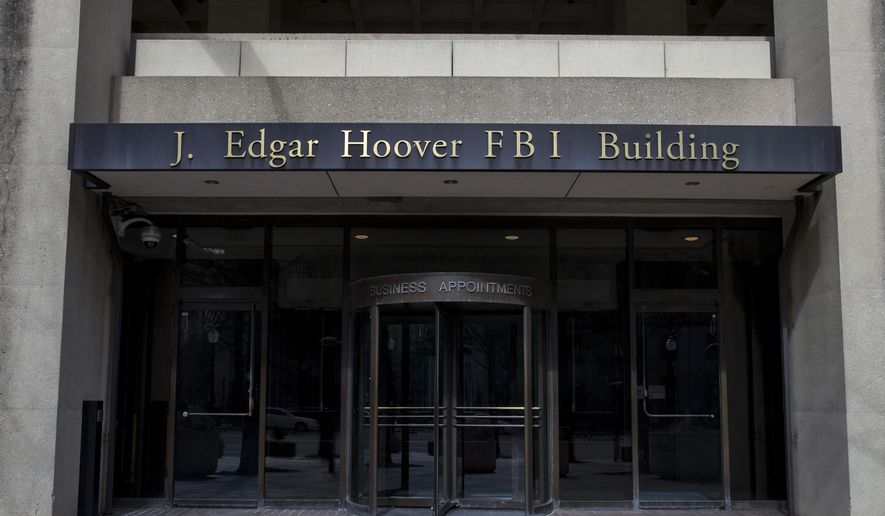The FBI failed to support claims it made in almost 200 applications to the secret court that signs off on warrants to spy on Americans, the Justice Department’s internal watchdog said Thursday.
DOJ Inspector General Michael E. Horowitz released a report saying the FBI ignored its own Woods Procedure — the set of rules the bureau follows to ensure accuracy in its applications to monitor Americans under the Foreign Intelligence Surveillance Act.
He uncovered at least 183 FISA applications between 2014 and 2019, in which the Woods File — the documentation intended to back up the FBI’s argument for surveillance — was missing, destroyed or incomplete.
“Given the FBI’s reliance upon its Woods Procedure to help ensure the accuracy of its FISA applications, we believe the missing Woods File represents a significant lapse in FBI’s management of its FISA program,” Mr. Horowitz wrote in his 60-page report.
The FBI’s handling of warrants under the FISA has been closely scrutinized since 2016 when the bureau obtained a warrant to snoop on Carter Page, a Trump campaign official. That warrant was largely based on the unsubstantiated and now-discredited Steele dossier and included at least one piece of information fabricated by an FBI lawyer.
FBI attorney Jason Jones said in a memo accompanying Mr. Horowitz’s report that the agency has made several changes to its FISA application process. He noted that the bureau has improved its policies and training efforts, and added a new electronic Woods File case management system.
“FBI leadership’s commitment to emphasize the importance of scrupulous accuracy will continue unabated, and the FBI believes they have been effective at significantly improving the FBI’s Woods Procedures compliance,” Mr. Jones said.
The FBI adopted the Woods Procedures in 2001 to ensure strict checks and balances on the verification of every assertion in support of a FISA wiretap. Under the Woods Procedures, the application was to be withdrawn or the assertion removed if a claim was not verifiable.
If an application is approved by the secret Foreign Intelligence Surveillance Court, the FBI is given a warrant to conduct a physical search or electronic surveillance of a U.S. citizen.
The warrants, Mr. Horowitz said, are one of the most “intrusive” tools the agency uses to investigate terrorism, espionage and other national security threats.
In the report, investigators also found more than 200 instances of unsupported, inaccurate or omitted information in 27 FISA applications. Of the 209 total errors, however, none were deemed to have undermined or impacted probable cause determinations made by the FISC.
Mr. Horowitz noted that “including frequent factual errors in numerous FISA applications, even if they are later determined not to be material, risks undermining the FISC’s and the public confidence in the FBI’s and DOJ’s FISA process and the quality of the FBI’s submissions.”
Moreover, the report determined that supervisory accuracy reviews of existing Woods Files “generally did not contain evidence of the thoroughness or completeness” required by FBI policy.
Mr. Horowitz blamed top brass for the failures, saying the lack of oversight “raises serious questions” about the application review process.
“We believe the shortcomings we identified occurred primarily because the FBI and the DOJ National Security Division did not place enough emphasis or attention on the need for rigorous supervisory review and robust oversight of FISA applications,” he said.
The inspector general acknowledged the “inevitability” of occasional human error, but he said mistakes of any magnitude show flaws in the process used to ensure accuracy and safeguard civil liberties.
“If the FBI falls short of its own standards for accuracy, it risks impinging on the civil liberties of U.S. persons, and adversely affecting its credibility with the FISC, Congress, and the public, which in turn could lead to restrictions or even revocation of its authorization to use this important investigative tool in support of its national security mission,” he said.
Mr. Horowitz outlined 10 recommendations, including establishing policies on the handling of Woods Files and creating a headquarters to ensure accountability and efficacy of the Woods Procedures.
• Jeff Mordock can be reached at jmordock@washingtontimes.com.
• Emily Zantow can be reached at ezantow@washingtontimes.com.




Please read our comment policy before commenting.